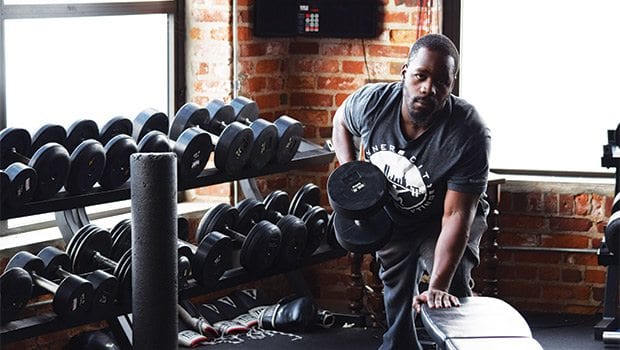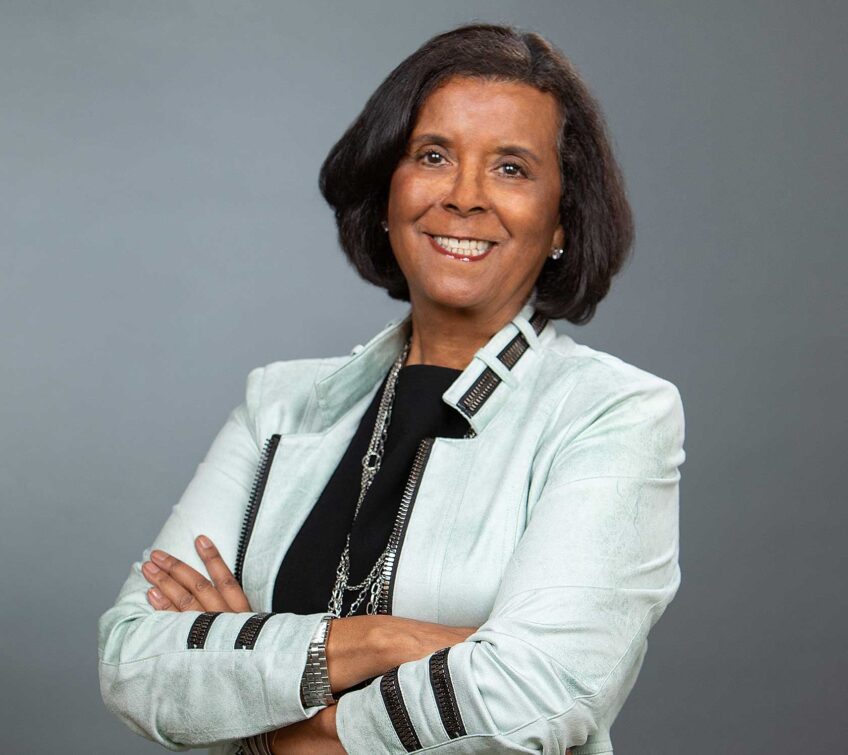Strength in human capital
Firm uses weightlifting to build employment skills

Many students graduate from business school hoping to start their own companies, with dreams of flowing revenue and impressive bottom lines. Jon Feinman, founder of Dorchester’s InnerCity Weightlifting, is a bit different. With his business he measures success in the number of people it is providing careers to or keeping them off the street and out of jail.
At the base level, InnerCity’s provides its “students” — typical age ranging from 17 to late 20s — with a safe haven at its Dorchester gym, a place to come and work out or hang out, but importantly off the streets. Ultimately, the goal is to excite the students enough about the potential of a career in personal fitness training that they take part in InnerCity’s own certification program, which allows them to start working and earning money as a personal trainer and then potentially move on to professional fitness training certification and more job opportunities.

Author: Martin DesmaraisInnerCity Weightlifting General Manager Reggie Talbert and founder Jon Feinman.
Started in 2010, with a Dorchester gym opening in 2012, the business offers training services to individuals and companies, with the training done in Dorchester, at a Kendall Square gym that was opened in May 2015 or at company sites.
InnerCity’s staff coaches certify its student trainers and oversee the training sessions with clients. The services come at a much cheaper rate than the $100-$150 most private gyms charge — personal training is $25 an hour, with training packages running from $125 for a startup introductory package to $650 for 18 sessions. Corporate sessions start at $220.
InnerCity’s student trainers earn $20 an hour typically, and can make up to $60 an hour for training groups.
The business has worked with over 300 clients and has corporate clients that include Microsoft, InsightSquared, VMware, Education First and Babson College.
For the students beginning careers in personal training, InnerCity offers them good consistent pay at $20 an hour, with some making as much as $30,000 a year.
Growth ahead
InnerCity keeps its business going through a combination of individual and corporate sponsorship and revenues from the fitness training services it provides. Feinman raised $75,000 to open the Dorchester gym and get InnerCity off the ground. Now, it brings in about $1.2 million a year from corporate support and training services. The vision is to have an increased network of locations to bring in more students, train more clients and generate profits to keep things running.
“The quality of training we are able to offer is as good as anyone, plus clients get the benefit of contributing to a social cause at the same time. So they get to change lives while changing their own,” said Feinman, who is in his early 30s and got the idea to start InnerCity Weightlifting by combining the business acumen he learned receiving his M.B.A. at Babson with the need he saw while working with AmeriCorps in Boston.
Feinman talks about the violence statistics in Boston with the knowledge of someone who has really delved into the problem and has the belief he can make a difference. He points out that only about 1 percent of the population accounts for 70 percent of the gun violence in the city. He says police data shows that there are about 400 individuals that are viewed as being at the heart of the gun violence in the city. For Feinman, that is a number he believes InnerCity Weightlifting can put a dent in.
Currently, there are just over 160 students that take part in what InnerCity’s offers, but there are 90 on the waitlist to join. InnerCity staff screens all candidates to join with the intent to work with those that are most at risk for contributing to gun violence.
All told, InnerCity has 11 fulltime staff running the organization and working with its students. Feinman said he hopes to double that number in 2016 to be able to add all the students that want in and with several hundred taking part have more of an impact as an option off the streets and a potential career track.
“There is a system driving what it going on and there is an opportunity we have, as an organization, and our training clients have to disrupt that system to impact our students’ lives and also the lives of their families and the communities around them,” he said.
Local roots
But Feinman is the first to admit that what really drives InnerCity Weightlifting are the students and especially the staff members who grew up in Boston. A native of Amherst, Feinman attended Bryant College in Rhode Island and graduated with a degree in business in 2005. He does not claim to have first-hand knowledge of what most of the program’s students go through beyond his AmeriCorps experience and what he has learned since starting InnerCity. This is why he says the students play a large role in driving the organization and helping make the programs for students appealing to those they are hoping to reach the most.
Staff members like Reggie Talbert, InnerCity’s general manager, are critical as an example of the positive impact it can have. Talbert spent almost three decades in and out of prison and on Boston’s streets, before getting involved with InnerCity as a volunteer and putting his final prison sentence behind him. He eventually joined the staff and is now ever-present at the Dorchester gym.

Author: Martin DesmaraisAn InnerCity Weightlifting employee trains at the Dorchester gym.
Talbert says he knows what the students are going through so he tries to relate and show them another way.
“It is a passion. Honestly, I have been jacked all my life, myself. I am no different than them. I am just older than them and I learned,” Talbert said. “Now, I am trying to get these kids to where I am.”
He said he absolutely sees a change in the students that are involved. While there is a money-making aspect to it for them, he believes it is not just about the money. He knows the students enjoy the haven from the streets, the space to work out and a break from what life may normally be like.
These are some of the same things that drew him to InnerCity Weightlifting.
“This organization it saves us and it saves the kids,” Talbert said.
The numbers look good so far. According to Feinman, the average arrests per student before joining the program is 12, with the average after joining only one arrest; 82 percent of the students were arrested for weapon possession before and only 4 percent have been arrested after; lastly, 70 percent of the students are currently on their longest time period out of prison.
Currently, 12 students work as personal trainers. One such trainer, R. Sandy, a 23-year-old from Roxbury, said the personal training career track has given him something he can focus on for the future and he is thrilled to finally have something.
“This is it. This is my career,” he said. “I am really working hard on it and I am going to keep working hard on it.”
In addition to working as a personal trainer through InnerCity, Sandy is also planning for the next level in the training industry — Personal Trainer Certification from the National Academy of Sports Medicine. This would allow him to work as a personal trainer and get jobs at any gym.
While Feinman loves having successful examples like Sandy involved with InnerCity, he said nothing would please him more if such students could also find more personal training work elsewhere and start earning the higher hourly wages more typical of the industry or, even better yet, start their own personal training businesses.
“Our job is to create that network that can help them get where they want to go, whether that is training or not,” he said.


![Banner [Virtual] Art Gallery](https://baystatebanner.com/wp-content/uploads/2024/04/Cagen-Luse_Men-at-store-e1713991226112-150x150.jpg)



